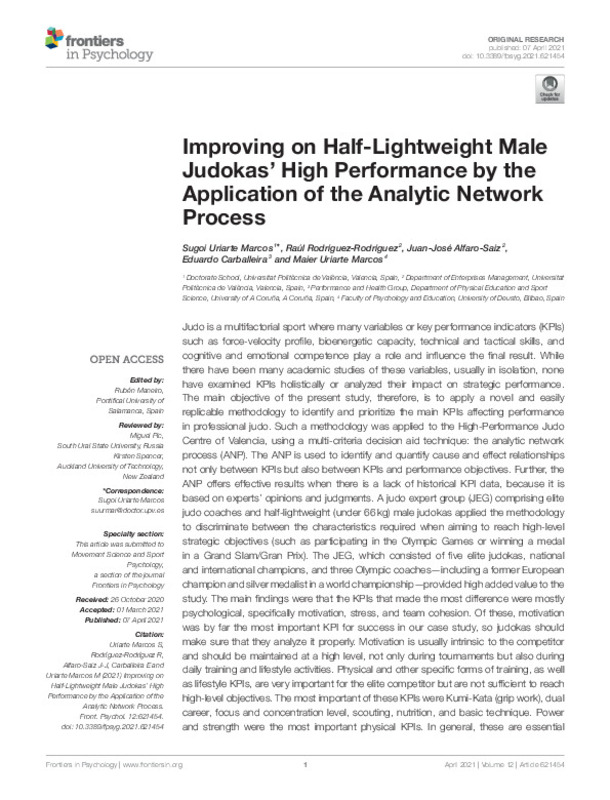JavaScript is disabled for your browser. Some features of this site may not work without it.
Buscar en RiuNet
Listar
Mi cuenta
Estadísticas
Ayuda RiuNet
Admin. UPV
Improving on Half-Lightweight Male Judokas' High Performance by the Application of the Analytic Network Process
Mostrar el registro sencillo del ítem
Ficheros en el ítem
| dc.contributor.author | Uriarte Marcos, Sugoi
|
es_ES |
| dc.contributor.author | Rodríguez Rodríguez, Raúl
|
es_ES |
| dc.contributor.author | Alfaro Saiz, Juan José
|
es_ES |
| dc.contributor.author | Carballeira, Eduardo
|
es_ES |
| dc.contributor.author | Uriarte Marcos, Maier
|
es_ES |
| dc.date.accessioned | 2022-06-16T18:05:35Z | |
| dc.date.available | 2022-06-16T18:05:35Z | |
| dc.date.issued | 2021-04-07 | es_ES |
| dc.identifier.uri | http://hdl.handle.net/10251/183400 | |
| dc.description.abstract | [EN] Judo is a multifactorial sport where many variables or key performance indicators (KPIs) such as force-velocity profile, bioenergetic capacity, technical and tactical skills, and cognitive and emotional competence play a role and influence the final result. While there have been many academic studies of these variables, usually in isolation, none have examined KPIs holistically or analyzed their impact on strategic performance. The main objective of the present study, therefore, is to apply a novel and easily replicable methodology to identify and prioritize the main KPIs affecting performance in professional judo. Such a methodology was applied to the High-Performance Judo Centre of Valencia, using a multi-criteria decision aid technique: the analytic network process (ANP). The ANP is used to identify and quantify cause and effect relationships not only between KPIs but also between KPIs and performance objectives. Further, the ANP offers effective results when there is a lack of historical KPI data, because it is based on experts' opinions and judgments. A judo expert group (JEG) comprising elite judo coaches and half-lightweight (under 66 kg) male judokas applied the methodology to discriminate between the characteristics required when aiming to reach high-level strategic objectives (such as participating in the Olympic Games or winning a medal in a Grand Slam/Gran Prix). The JEG, which consisted of five elite judokas, national and international champions, and three Olympic coaches-including a former European champion and silver medalist in a world championship-provided high added value to the study. The main findings were that the KPIs that made the most difference were mostly psychological, specifically motivation, stress, and team cohesion. Of these, motivation was by far the most important KPI for success in our case study, so judokas should make sure that they analyze it properly. Motivation is usually intrinsic to the competitor and should be maintained at a high level, not only during tournaments but also during daily training and lifestyle activities. Physical and other specific forms of training, as well as lifestyle KPIs, are very important for the elite competitor but are not sufficient to reach high-level objectives. The most important of these KPIs were Kumi-Kata (grip work), dual career, focus and concentration level, scouting, nutrition, and basic technique. Power and strength were the most important physical KPIs. In general, these are essential for meeting strategic objectives, but they do not make the crucial difference. This suggests that professional psychological support should be provided in daily training and that international team composition and internships should be fostered. | es_ES |
| dc.language | Inglés | es_ES |
| dc.publisher | Frontiers Media SA | es_ES |
| dc.relation.ispartof | Frontiers in Psychology | es_ES |
| dc.rights | Reconocimiento (by) | es_ES |
| dc.subject | Performance improvements | es_ES |
| dc.subject | Judo | es_ES |
| dc.subject | Psychology skills | es_ES |
| dc.subject | Analytic network process | es_ES |
| dc.subject | Key performance indicators | es_ES |
| dc.subject.classification | ORGANIZACION DE EMPRESAS | es_ES |
| dc.title | Improving on Half-Lightweight Male Judokas' High Performance by the Application of the Analytic Network Process | es_ES |
| dc.type | Artículo | es_ES |
| dc.identifier.doi | 10.3389/fpsyg.2021.621454 | es_ES |
| dc.rights.accessRights | Abierto | es_ES |
| dc.contributor.affiliation | Universitat Politècnica de València. Departamento de Organización de Empresas - Departament d'Organització d'Empreses | es_ES |
| dc.description.bibliographicCitation | Uriarte Marcos, S.; Rodríguez Rodríguez, R.; Alfaro Saiz, JJ.; Carballeira, E.; Uriarte Marcos, M. (2021). Improving on Half-Lightweight Male Judokas' High Performance by the Application of the Analytic Network Process. Frontiers in Psychology. 12:1-15. https://doi.org/10.3389/fpsyg.2021.621454 | es_ES |
| dc.description.accrualMethod | S | es_ES |
| dc.relation.publisherversion | https://doi.org/10.3389/fpsyg.2021.621454 | es_ES |
| dc.description.upvformatpinicio | 1 | es_ES |
| dc.description.upvformatpfin | 15 | es_ES |
| dc.type.version | info:eu-repo/semantics/publishedVersion | es_ES |
| dc.description.volume | 12 | es_ES |
| dc.identifier.eissn | 1664-1078 | es_ES |
| dc.identifier.pmid | 33897530 | es_ES |
| dc.identifier.pmcid | PMC8058178 | es_ES |
| dc.relation.pasarela | S\449853 | es_ES |
| upv.costeAPC | 3309,35 | es_ES |








